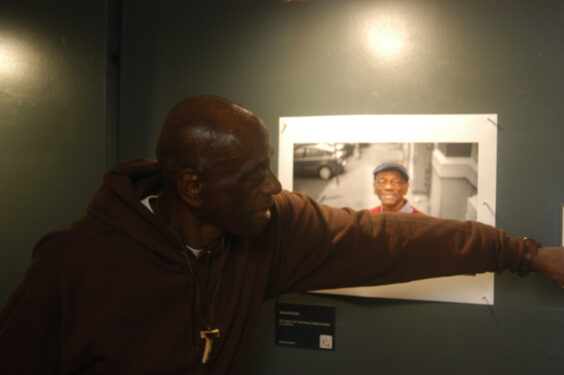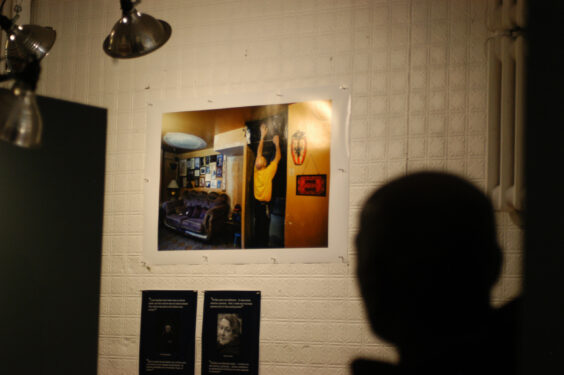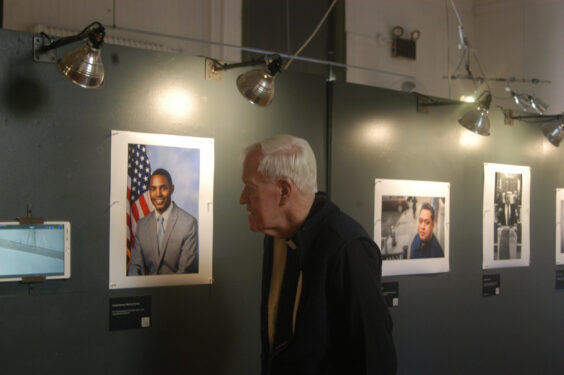SOUTH BRONX — Three years ago, Bernard Smith completely transformed his living room at the Morris Houses into his bedroom. But it was not by choice or because he didn’t have the room.
It was because the alternative was having water dripping onto him as he slept, or having mildew seeping into his sinuses, sending him into coughing fits.
Smith is one of thousands of residents in New York City Housing Authority apartments who have fought for years to have annoying leaks, and potentially toxic mold, removed from their apartments.

His story, along with those of more than a dozen others who have suffered similar hardships and battled — often unsuccessfully — for relief from NYCHA’s byzantine bureaucracy, was recently depicted in an oral and photographic exhibition at the Bronx Documentary Center.
The exhibit, “Speak Out,” depicted the yearslong process of grassroots organizing and lawsuit battles, led by leaders from Manhattan Together and South Bronx Churches — organized under the Metro Industrial Areas Foundation — to secure better living conditions for residents of public housing in the city.
It was a multimedia work produced by Philip Norman, an oral historian who interviewed more than 20 people as part of this project. While the physical exhibit at the Bronx Documentary Center was closed on Nov. 5, these interviews, along with Spanish-language translations, can be found online at www.speak-out-stories.org.
It used to be embarrassing, Smith admitted, to discuss what he endured in 50 years as a NYCHA resident: the frustration of seeing mold being painted over instead of removed, or not being able to get any response to persistent requests for maintenance assistance.

“If you need a simple repair, you have to wait weeks to get it done,” said Smith, 73, an outspoken leader in South Bronx Churches for the past 20 years. “When you have kids, grandkids coming by the house, it [the danger of exposure to mold] affects them more than us adults.”
Smith said he finally got satisfaction when he found out about the Mold and Leak Ombudsperson Call Center (OCC), an independent contractor that has, to date, helped more than 16,000 tenants get mold removed from their apartments.
The OCC was formed as a result of a 2013 class action lawsuit, Baez v. NYCHA, filed on behalf of tenants represented by South Bronx Churches and Manhattan Together. In a court-ordered settlement, NYCHA was required to properly fix reported mold incidents in 15 days or less. A year later, when NYCHA had failed to comply with the order, the authority was held in contempt, and the call center was created to provide independent oversight of its performance.
“Asthma is so rampant [in NYCHA housing],” Smith said. “You’d be surprised how many people are on the [breathing] machine, not just the inhaler. You don’t know what they go home to.”
Father Francis Skelly, who was pastor of Immaculate Conception Church in the South Bronx for years, co-founded South Bronx Churches more than 30 years ago and helped organize the class action lawsuit. Even now, he meets every two months with NYCHA and lawyers for the advocacy groups to discuss current and future issues in local public housing developments.

While the Speak Out exhibit primarily focused on Manhattan and Bronx advocates, poor health in public housing is a citywide issue. In the Diocese of Brooklyn, Father Ed Mason, pastor of Mary, Mother of the Church Parish in New Lots, has encouraged his parishioners living in NYCHA developments to turn to OCC for help with their mold-related problems.
“We’re not against NYCHA. NYCHA is one of the few places in the city that actually has affordable housing for working class people and lower income people,” Father Skelly insisted. “NYCHA is really a resource that we want to fix.”

